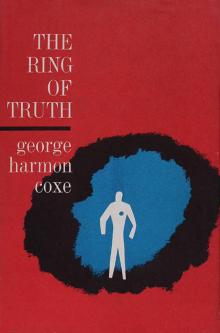- Home
- The Ring of Truth
George Harmon Coxe Page 18
George Harmon Coxe Read online
Page 18
“Well,” he said, when he had a cigarette going, “I hate to admit it, and I was a long time seeing it your way, but you were right again, Doc.”
“So were you.”
“Hunh?”
“About the chloral hydrate.” Standish smiled. “Almost from the first you said if anyone had fed it to Flemming it was the girl. And she did.”
“Yeah. . . . That’s right, I did.” Ballard chuckled at the memory and then said: “When did you really tumble it was her?”
“Not until this afternoon when I got word from Clem Jones and found out Sheila was the mysterious brunette who had been seeing Tremaine Sunday or Monday nights— the only ones she was free. After that things began to add up pretty fast.”
“But what did Clem have to do with it?”
“He analyzed some hair for me.” He explained about the black hair he had found in Donald Tremaine’s apartment and what he had done with it. “Clem said it was dyed.”
“So?”
“Dyed all the way. From tip to tip.” Standish sampled his drink and it tasted good. “As a matter of fact, it wasn’t even human hair. Some synthetic they’ve been using recently since the wig business started to get big.”
“Oh.” Ballard nodded. “Yeah,” he said. “And a brunette like Mrs. Tremaine would hardly be wearing a brunette wig. . . . And the hell of it is—excuse me, Mary—she would have gotten away with it if you hadn’t found that little powder paper’ she discarded and then had it tested for chloral hydrate. . . . What would the chances be of finding traces of the drug in Flemming when you did the p.m. if you hadn’t already suspected it?”
“Remote.”
“Yeah.” Ballard grinned, his eyes friendly and respectful. “You’re like old Doc Lathrop,” he said. “You got curious and you didn’t care what anybody said, or if it was your business or not, you couldn’t let it go until you had the truth. I guess that was it, hunh?”
Standish tried to consider the question objectively. He was too tired to feel any sense of personal accomplishment but he did remember Ralph Estey’s insurance policy that would now be paid to his young son and the thought that he had been able to clear his friend’s name was strangely satisfying. He did not say so. He did not want to talk about it. It seemed much easier to agree with Ballard.
“Maybe something like that, Tom,” he said finally. But even as he spoke he remembered Sheila’s strange appeal and it came to him that, given a different set of circumstances, he might have been no more able to resist her than Donald Tremaine and the others.
It was not a flattering thought, or an easy one to dismiss. He finished his drink and stood up, and Mary was beside him as he said good night to Ballard and took her arm. It felt firm and warm under his hand, and as she smiled up at him he knew that here at least was something real, something honest, something good.

 George Harmon Coxe
George Harmon Coxe